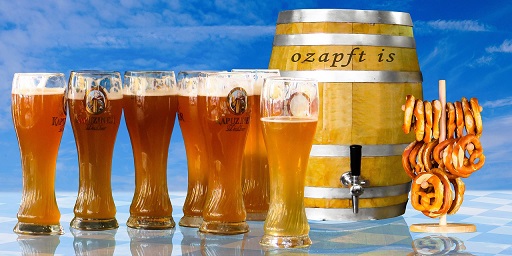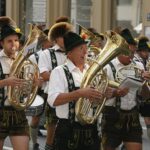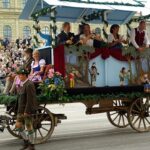
When most people think of Oktoberfest, one image springs to mind: overflowing beer steins in massive tents filled with laughing tourists in Dirndls and Lederhosen. But for those who’ve experienced the Wiesn firsthand – or who grew up with it – Oktoberfest is far more than a drinking holiday. It’s a living tradition, deeply rooted in Bavarian culture and German identity.
From historical parades and brass bands to family rides and royal beginnings, the world’s largest Volksfest offers layers of meaning and heritage that most guidebooks skip. This article is your full cultural guide to Oktoberfest – what lies beneath the beer foam – and an introduction to a five-part series exploring its lesser-known dimensions.
➡️ Explore more cultural deep dives:
- What to Wear to Oktoberfest: Dirndls, Lederhosen, and Modern Tracht
- The Oktoberfest Parade: Marching Through Bavarian History
- Oompah Bands and Beer Tents: The Soundtrack of Oktoberfest
- Oktoberfest Origins: From Royal Wedding to Global Icon
A Festival of Heritage – Not Just Hops
Oktoberfest began in 1810 as a public celebration of the marriage between Crown Prince Ludwig of Bavaria and Princess Therese of Saxony-Hildburghausen. Munich’s citizens were invited to fields (now called the Theresienwiese) for five days of horse races, dancing, and feasting.
Over two centuries later, the beer tents are just one component of a celebration that still retains strong links to history, community, and identity:
- Cultural processions and traditional costume parades
- Bavarian folk music performed live
- Carnival rides and games for families
- Artisan food stalls, handicrafts, and regional specialties
1. The Parade: More Than Just Pageantry
One of the lesser-known highlights of Oktoberfest is its grand opening weekend parade – the Trachten- und Schützenzug (Costume and Riflemen’s Parade). Stretching through Munich’s old town, it features over 9,000 participants, including:
- Historical reenactors in traditional outfits
- Riflemen guilds and town bands
- Highlanders, farmers, and mounted police
- Giant regional flags, banners, and flower-covered wagons
This isn’t just a show for tourists. It’s a showcase of Germany’s diverse regional traditions and a proud act of intergenerational cultural preservation.
➡️ Read more: The Oktoberfest Parade: Marching Through Bavarian History
2. Dirndls and Lederhosen: Why People Still Wear Them
What began as peasant clothing has become a symbol of pride. Traditional Bavarian dress – known as Tracht – has seen a huge resurgence thanks to Oktoberfest. But it’s not just costume cosplay:
- Dirndls and Lederhosen are worn with regional variations that express hometown roots
- Accessories like Gamsbart (boar-hair hat brushes) and embroidered suspenders carry family significance
- High-quality Tracht is passed down through generations
Today’s visitors can rent or buy attire, but locals often own meticulously curated outfits, wearing them proudly year after year.
➡️ Full guide: What to Wear to Oktoberfest: Dirndls, Lederhosen, and Modern Tracht
3. Music as Ritual: The Role of Oompah Bands
The infectious rhythm of brass bands is the heartbeat of Oktoberfest. But what seems like background noise to tourists is a cherished ritual for locals:
- Each tent has its own house band, some with decades of tradition
- Setlists blend folk music, polkas, waltzes, and even classic rock covers
- Songs like Ein Prosit create unity and prompt synchronized toasts
Music dictates the mood – mellow at midday, rowdy by evening – and keeps the cultural tone distinct from a typical beer festival.
➡️ Don’t miss: Oompah Bands and Beer Tents: The Soundtrack of Oktoberfest
4. Family Traditions: Tuesday is Kinderfest
Oktoberfest isn’t just for beer lovers. Every Tuesday is Family Day, where rides, food, and game booths offer discounts for children and parents. Local families treat it as a beloved tradition:
- Rides like the Teufelsrad (Devil’s Wheel) and historic carousel
- Gingerbread hearts, roasted almonds, and non-alcoholic beer
- Puppet shows, candy stalls, and clown parades
Entire generations return year after year, reliving memories and passing down stories.
5. The History of Oktoberfest: More Than Munich
While today’s Oktoberfest draws over six million visitors annually, it was never meant to become a global beer extravaganza. The original festival honored royal civic unity – and its evolution tracks Germany’s journey through:
- Industrialization
- Two World Wars
- Reunification and modern tourism
It’s now a cultural export, with Oktoberfests celebrated worldwide – from Brazil to Brisbane – but the heart remains in Munich, anchored by tradition.
➡️ In-depth timeline: Oktoberfest Origins: From Royal Wedding to Global Icon
Oktoberfest’s Cultural Values – In Practice
| German Value | Oktoberfest Expression |
|---|---|
| Heritage | Costume parades, traditional dress, local customs |
| Community | Shared beer benches, singing together, multi-generational fun |
| Order | Security, cleanliness, and well-organized tent logistics |
| Craftsmanship | Quality beer, handmade Tracht, artisan food |
| Celebration | Balance of reverence, pride, and joyful participation |
Practical Tips for Visitors Who Want More Than Beer
- Visit midweek to avoid party crowds and appreciate traditions
- Watch the parades – arrive early and find a good spot near Odeonsplatz
- Go during the day for a calmer, more authentic feel
- Engage with locals – ask about their outfits, music, or where they grew up
- Respect the etiquette – know the lyrics to Ein Prosit, toast with eye contact, don’t stand on benches
Oktoberfest is a cultural time capsule – updated for a modern world, yet proudly grounded in Bavarian identity. Beneath the buzz of beer and brass lies a rich tapestry of heritage, social codes, and heartfelt community.
So yes, raise your stein – but don’t forget to raise your cultural awareness too.
➡️ Explore more Oktoberfest articles:






